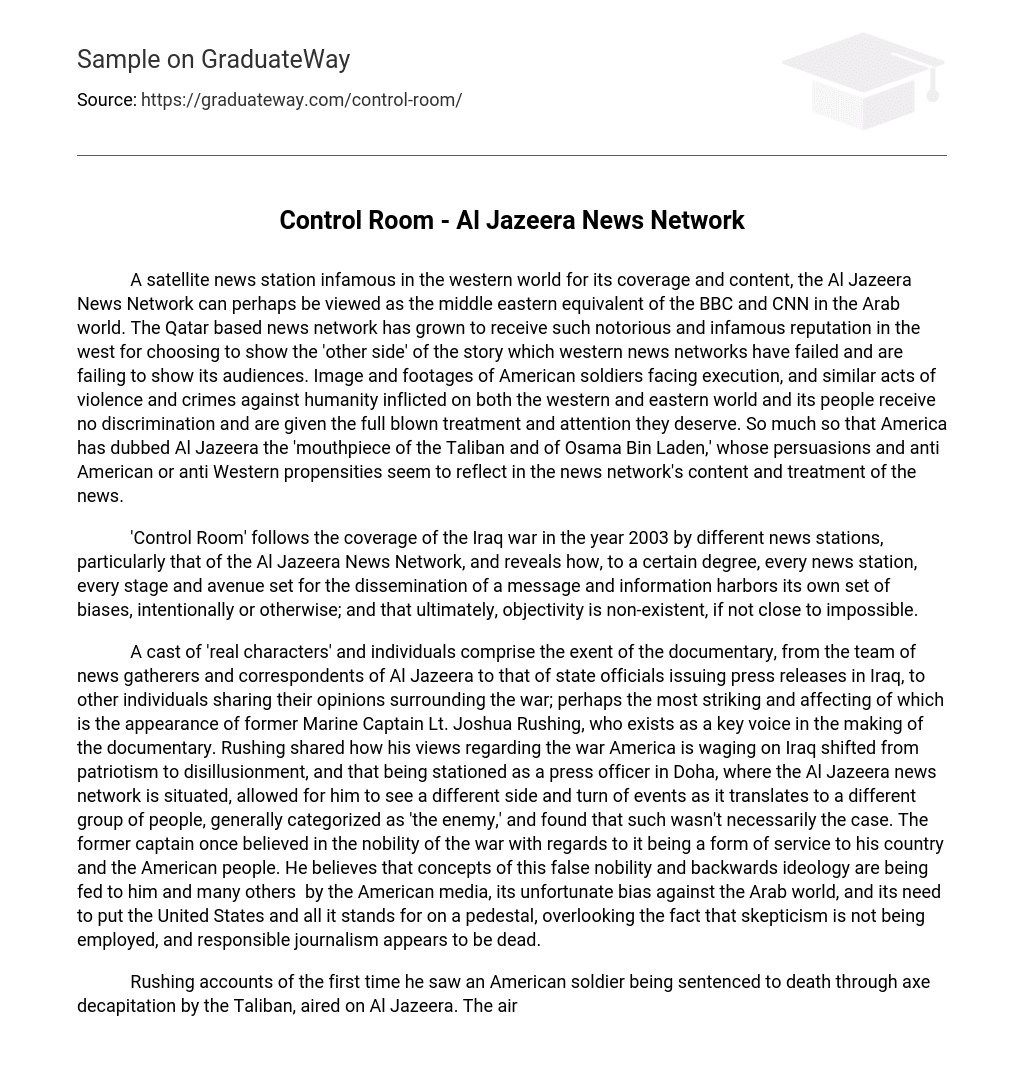A satellite news station infamous in the western world for its coverage and content, the Al Jazeera News Network can perhaps be viewed as the middle eastern equivalent of the BBC and CNN in the Arab world. The Qatar based news network has grown to receive such notorious and infamous reputation in the west for choosing to show the ‘other side’ of the story which western news networks have failed and are failing to show its audiences. Image and footages of American soldiers facing execution, and similar acts of violence and crimes against humanity inflicted on both the western and eastern world and its people receive no discrimination and are given the full blown treatment and attention they deserve. So much so that America has dubbed Al Jazeera the ‘mouthpiece of the Taliban and of Osama Bin Laden,’ whose persuasions and anti American or anti Western propensities seem to reflect in the news network’s content and treatment of the news.
‘Control Room’ follows the coverage of the Iraq war in the year 2003 by different news stations, particularly that of the Al Jazeera News Network, and reveals how, to a certain degree, every news station, every stage and avenue set for the dissemination of a message and information harbors its own set of biases, intentionally or otherwise; and that ultimately, objectivity is non-existent, if not close to impossible.
A cast of ‘real characters’ and individuals comprise the exent of the documentary, from the team of news gatherers and correspondents of Al Jazeera to that of state officials issuing press releases in Iraq, to other individuals sharing their opinions surrounding the war; perhaps the most striking and affecting of which is the appearance of former Marine Captain Lt. Joshua Rushing, who exists as a key voice in the making of the documentary. Rushing shared how his views regarding the war America is waging on Iraq shifted from patriotism to disillusionment, and that being stationed as a press officer in Doha, where the Al Jazeera news network is situated, allowed for him to see a different side and turn of events as it translates to a different group of people, generally categorized as ‘the enemy,’ and found that such wasn’t necessarily the case. The former captain once believed in the nobility of the war with regards to it being a form of service to his country and the American people. He believes that concepts of this false nobility and backwards ideology are being fed to him and many others by the American media, its unfortunate bias against the Arab world, and its need to put the United States and all it stands for on a pedestal, overlooking the fact that skepticism is not being employed, and responsible journalism appears to be dead.
Rushing accounts of the first time he saw an American soldier being sentenced to death through axe decapitation by the Taliban, aired on Al Jazeera. The aired execution left him feeling nauseated but gave him an epiphany on the type of reality soldiers like him are facing in Iraq, “in America war isn’t hell—we don’t see blood, we don’t see suffering. All we see is patriotism.” He also reluctantly confesses of seeing piles of dead Iraqi bodies, of militants and civilians alike, women and children, being briefly disturbed but not having as much lasting effect on him that when he turns to eat dinner at the end of the day, all concern and worry for the said issue is completely forgotten. Whereas images of his fellow soldiers and Americans are likely to stick to him more. It upsets him that this part of his humanity has made itself evident. Lt. Rushing is aware of the differences of both sides, how America and the Arab world are both affected by the war, but have different versions of it. And much as he would want these differences and conflicts to disappear altogether, he knows such won’t soon be the case. He adds conclusively, “It makes me hate war, but it doesn’t make me believe that we’re in a world that can live without war yet.”
Watching control room has been a definite eye opener, for the most part to Americans like myself. It showed an aspect of war that is naturally assumed to be ugly, but is being glossed over and tucked away by the ‘mainstream’ media that the American public is tuned to. In the middle of the documentary, a line from a reporter sneaks in with a statement of half truth, it goes, “Al Jazeera’s job is to educate the Arab people on democracy…to awaken them.” This is true on a general note, but it is also a truth which rings certain to non-Arabs, and Americans alike, who deserve to be educated of the different reality and points of view which exist elsewhere and everywhere. But the American populace is being deprived of it because of the limited pool of information and ‘news worthy’ materials our media chooses to propagate.
I believe that a great number of casualties are always affected in the time of war, but this is a reality which unfortunately won’t be resolved anytime automatically. All that is certain is that people have a right and obligation to awareness of differing views and perspectives, and knowledge of the alleged ‘good’ and ‘evil’ side of every issue. This awareness will enable one individual to apply the little humanity he/she has left, enabling the rest of us to become better individuals and tread towards understanding, if not into becoming better versions of ourselves.





